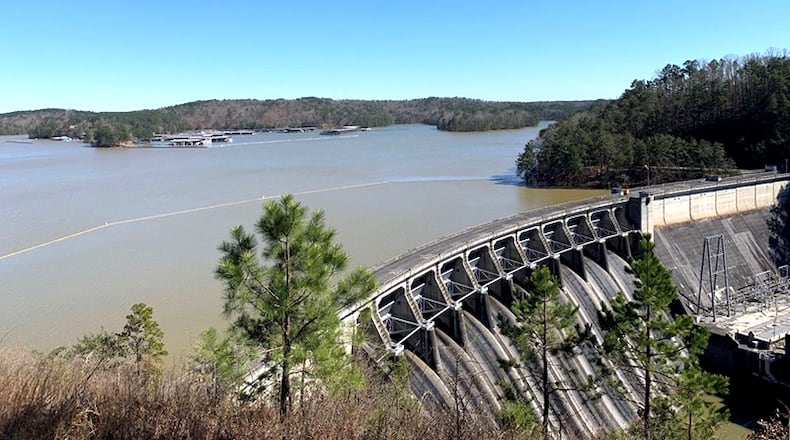A federal judge sided Monday with Georgia in a fight with Alabama over use of their shared water supplies to serve Atlanta’s growing suburbs, handing the Peach State another win in one of the long-running “water wars” disputes.
The ruling by U.S. District Court Judge Loren L. AliKhan of the D.C. Circuit resolves the last remaining water fight between the two states and further solidifies the supplies of hundreds of thousands of customers in Cobb County and nearby Cartersville.
The case centered on the divvying up of water from the Lake Allatoona reservoir 30 miles northwest of Atlanta.
Today, Lake Allatoona is a popular recreation area, but it was originally created in the 1940s by the U.S. Army Corps of Engineers to help with flood control on the Etowah River and to serve as a hydropower reservoir.
The lake and river are both part of the vast Alabama-Coosa-Tallapoosa (ACT) River Basin, which spans nearly 22,800 square miles in Alabama, Georgia and a sliver of Tennessee. The river system empties into the Gulf of Mexico at Mobile Bay but along the way, it supplies water to homes, businesses and farms.
To serve Atlanta’s growing suburbs, Georgia requested in 2018 to increase its allowed daily withdrawals from Lake Allatoona from 37.1 million gallons to 94 million gallons. The extra water serves the Cobb County-Marietta Water Authority and its roughly 900,000 customers, along with the city of Cartersville in Bartow County.
In 2021, the corps granted Georgia’s request to increase its withdrawals, but Alabama challenged the decision in court, arguing the move violated the federal Water Supply Act. Alabama said the corps overstepped its legal authority in giving Georgia approval to pull more water from the reservoir. The state claimed the size of the increase should have required Congress to approve it and argued the corps did not adequately assess the impact of the new withdrawals on users downstream.
But the judge disagreed sharply, writing the corps “conducted a comprehensive analysis of Georgia’s request and determined that it would have no ‘appreciable effect.‘” The judge also found it was within the corps’ power to approve the added withdrawals without Congress’ approval.
In a statement, Gov. Brian Kemp said the ruling “brings greater certainty to our state’s access to the water supply from Allatoona Lake.”
“The state of Georgia will continue to work with stakeholders and be a good steward of our natural resources as we continue to grow,” Kemp added.
Danny Johnson, the managing director of natural resources for the Atlanta Regional Commission, which oversees water planning for the vast metro Atlanta region, also cheered the decision.
“We are pleased to have a final decision that brings long-awaited certainty to all ACT stakeholders after decades of litigation,” Johnson said in a statement.
The offices of Alabama Attorney General Steve Marshall and the corps’ Mobile District did not immediately respond to requests for comment.
The ruling is the latest legal decision to break Georgia’s way in the “water wars” cases, some of which have also involved Florida.
In a separate case in 2021, the U.S. Supreme Court ruled against Florida, which had argued water use from the Chattahoochee and Flint rivers by Georgia residents during a 2012 drought crippled the Apalachicola Bay oyster industry.
In another ACT Basin case, a federal judge in 2023 delivered another ruling in Georgia’s favor. In that litigation, the court found the corps followed the law in crafting its new master plan for the basin system, which allowed more water to be stored in Georgia’s reservoirs.
About the Author
Keep Reading
The Latest
Featured




